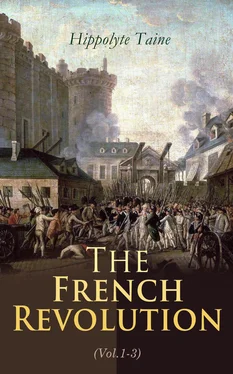In short, the largest portion of the army has deserted. However kind a superior officer might be, the fact of his being a superior officer secures for him the treatment of an enemy. The governor, "M. de Sombreuil, against whom these people could utter no reproach," will soon see his artillerists point their guns at his apartment, and will just escape being hung on the iron-railings by their own hands. Thus the force which is brought forward to suppress insurrection only serves to furnish it with recruits. And even worse, for the display of arms that was relied on to restrain the mob, furnished the instigation to rebellion.
VI.—July 13th and 14th 1789.
Table of Contents
The fatal moment has arrived; it is no longer a government which falls that it may give way to another; it is all government which ceases to exist in order to make way for an intermittent despotism, for factions blindly impelled on by enthusiasm, credulity, misery, and fear. 1233Like a tame elephant suddenly become wild again, the mob throws off it ordinary driver, and the new guides who it tolerates perched on its neck are there simply for show. In future it will move along as it pleases, freed from control, and abandoned to its own feelings, instincts, and appetites.—Apparently, there was no desire to do more than anticipate its aberrations. The King has forbidden all violence; the commanders order the troops not to fire; 1234but the excited and wild animal takes all precautions for insults; in future, it intends to be its own conductor, and, to begin, it treads its guides under foot.—On the 12th of July, near noon, 1235on the news of the dismissal of Necker, a cry of rage arises in the Palais-Royal; Camille Desmoulins, mounted on a table, announces that the Court meditates "a St. Bartholomew of patriots." The crowd embrace him, adopt the green cockade which he has proposed, and oblige the dancing-saloons and theaters to close in sign of mourning: they hurry off to the residence of Curtius, and take the busts of the Duke of Orleans and of Necker and carry them about in triumph.—Meanwhile, the dragoons of the Prince de Lambesc, drawn up on the Place Louis-Quinze, find a barricade of chairs at the entrance of the Tuileries, and are greeted with a shower of stones and bottles. 1236Elsewhere, on the Boulevard, before the Hôtel Montmorency, some of the French Guards, escaped from their barracks, fired on a loyal detachment of the "Royal Allemand."—The alarm bell is sounding on all sides, the shops where arms are sold are pillaged, and the Hôtel-de-Ville is invaded; fifteen or sixteen well-disposed electors, who meet there, order the districts to be assembled and armed.—The new sovereign, the people in arms and in the street, has declared himself.
The dregs of society at once come to the surface. During the night between the 12th and 13th of July, 1237"all the barriers, from the Faubourg Saint-Antoine to the Faubourg Saint-Honoré, besides those of the Faubourgs Saint-Marcel and Saint-Jacques, are forced and set on fire." There is no longer an octroi; the city is without a revenue just at the moment when it is obliged to make the heaviest expenditures; but this is of no consequence to the mob, which, above all things, wants to have cheap wine. "Ruffians, armed with pikes and sticks, proceed in several parties to give up to pillage the houses of those who are regarded as enemies to the public welfare." "They go from door to door crying, 'Arms and bread!' During this fearful night, the bourgeoisie kept themselves shut up, each trembling at home for himself and those belonging to him." On the following day, the 13th, the capital appears to be given up to bandits and the lowest of the low. One of the bands hews down the gate of the Lazarists, destroys the library and clothes-presses, the pictures, the windows and laboratory, and rushes to the cellars; where it staves in the casks and gets drunk: twenty-four hours after this, about thirty of them are found dead and dying, drowned in wine, men and women, one of these being at the point of childbirth. In front of the house 1238the street is full of the wreckage, and of ruffians who hold in their hands, "some, eatables, others a jug, forcing the passers-by to drink, and pouring out wine to all comers. Wine runs down into the gutter, and the scent of it fills the air;" it is a drinking bout: meanwhile they carry away the grain and flour which the monks kept on hand according to law, fifty-two loads of it being taken to the market. Another troop comes to La Force, to deliver those imprisoned for debt; a third breaks into the Garde Meuble, carrying away valuable arms and armour. Mobs assemble before the hotel of Madame de Breteuil and the Palais-Bourbon, which they intend to ransack, in order to punish their proprietors. M. de Crosne, one of the most liberal and most respected men of Paris, but, unfortunately for himself a lieutenant of the police, is pursued, escaping with difficulty, and his hotel is sacked.—During the night between the 13th and 14th of May, the baker's shops and the wine shops are pillaged; "men of the vilest class, armed with guns, pikes, and turnspits, make people open their doors and give them something to eat and drink, as well as money and arms." Vagrants, ragged men, several of them "almost naked," and "most of them armed like savages, and of hideous appearance;" they are "such as one does not remember to have seen in broad daylight;" many of them are strangers, come from nobody knows where. 1239It is stated that there were 50,000 of them, and that they had taken possession of the principal guard-houses.
During these two days and nights, says Bailly, "Paris ran the risk of being pillaged, and was only saved from the marauders by the National Guard." Already, in the open street, 1240"these creatures tore off women's shoes and earrings," and the robbers were beginning to have full sway.—Fortunately the militia organized itself and the principal inhabitants and gentlemen enrolled themselves; 48,000 men are formed into battalions and companies; the bourgeoisie buy guns of the vagabonds for three livres apiece, and sabers or pistols for twelve sous. At last, some of the offenders are hung on the spot, and others disarmed, and the insurrection again becomes political. But, whatever its object, it remains always wild, because it is in the hands of the mob. Dusaulx, its panegyrist, confesses 1241that "he thought he was witnessing the total dissolution of society." There is no leader, no management. The electors who have converted themselves into the representatives of Paris seem to command the crowd, but it is the crowd which commands them. One of them, Legrand, to save the Hôtel-de-Ville, has no other resource but to send for six barrels of gun-powder, and to declare to the assailants that he is about to blow everything into the air. The commandant whom they themselves have chosen, M. de Salles, has twenty bayonets at his breast during a quarter of an hour, and, more than once, the whole committee is near being massacred. Let the reader imagine, on the premises where the discussions are going on, and petitions are being made, "a concourse of fifteen hundred men pressed by a hundred thousand others who are forcing an entrance," the wainscoting cracking, the benches upset one over another, the enclosure of the bureau pushed back against the president's chair, a tumult such as to bring to mind 'the day of judgment," the death-shrieks, songs, yells, and "people beside themselves, for the most part not knowing where they are nor what they want."—Each district is also a petty center, while the Palais-Royal is the main center. Propositions, "accusations, and deputations travel to and fro from one to the other, along with the human torrent which is obstructed or rushes ahead with no other guide than its own inclination and the chances of the way. One wave gathers here and another there, their strategy consisting in pushing and in being pushed. Yet, their entrance is effected only because they are let in. If they get into the Invalides it is owing to the connivance of the soldiers.—At the Bastille, firearms are discharged from ten in the morning to five in the evening against walls forty feet high and thirty feet thick, and it is by chance that one of their shots reaches an invalid on the towers. They are treated the same as children whom one wishes to hurt as little as possible. The governor, on the first summons to surrender, orders the cannon to be withdrawn from the embrasures; he makes the garrison swear not to fire if it is not attacked; he invites the first of the deputations to lunch; he allows the messenger dispatched from the Hôtel-de-Ville to inspect the fortress; he receives several discharges without returning them, and lets the first bridge be carried without firing a shot. 1242When, at length, he does fire, it is at the last extremity, to defend the second bridge, and after having notified the assailants that he is going to do so. In short, his forbearance and patience are excessive, in conformity with the humanity of the times. The people, in turn, are infatuated with the novel sensations of attack and resistance, with the smell of gunpowder, with the excitement of the contest; all they can think of doing is to rush against the mass of stone, their expedients being on a level with their tactics. A brewer fancies that he can set fire to this block of masonry by pumping over it spikenard and poppy-seed oil mixed with phosphorus. A young carpenter, who has some archaeological notions, proposes to construct a catapult. Some of them think that they have seized the governor's daughter, and want to burn her in order to make the father surrender. Others set fire to a projecting mass of buildings filled with straw, and thus close up the passage. "The Bastille was not taken by main force," says the brave Elie, one of the combatants; "it surrendered before even it was attacked," 1243by capitulation, on the promise that no harm should be done to anybody. The garrison, being perfectly secure, had no longer the heart to fire on human beings while themselves risking nothing, 1244and, on the other hand, they were unnerved by the sight of the immense crowd. Eight or nine hundred men only 1245were concerned in the attack, most of them workmen or shopkeepers belonging to the faubourg, tailors, wheelwrights, mercers and wine-dealers, mixed with the French Guards. The Place de la Bastille, however, and all the streets in the vicinity, were crowded with the curious who came to witness the sight; "among them," says a witness, 1246"were a number of fashionable women of very good appearance, who had left their carriages at some distance." To the hundred and twenty men of the garrison looking down from their parapets it seemed as though all Paris had come out against them. It is they, also, who lower the drawbridge an introduce the enemy: everybody has lost his head, the besieged as well as the besiegers, the latter more completely because they are intoxicated with the sense of victory. Scarcely have they entered when they begin the work of destruction, and the latest arrivals shoot at random those that come earlier; "each one fires without heeding where or on whom his shot tells." Sudden omnipotence and the liberty to kill are a wine too strong for human nature; giddiness is the result; men see red, and their frenzy ends in ferocity.
Читать дальше












